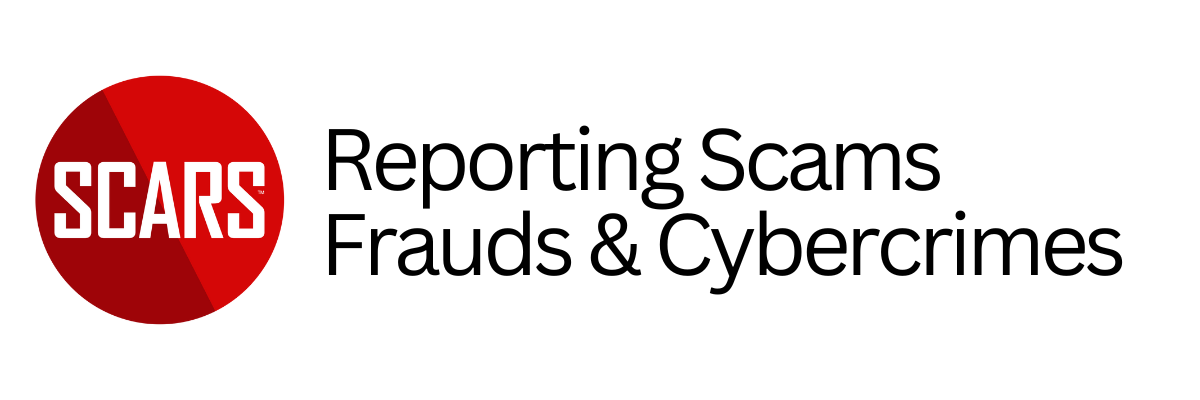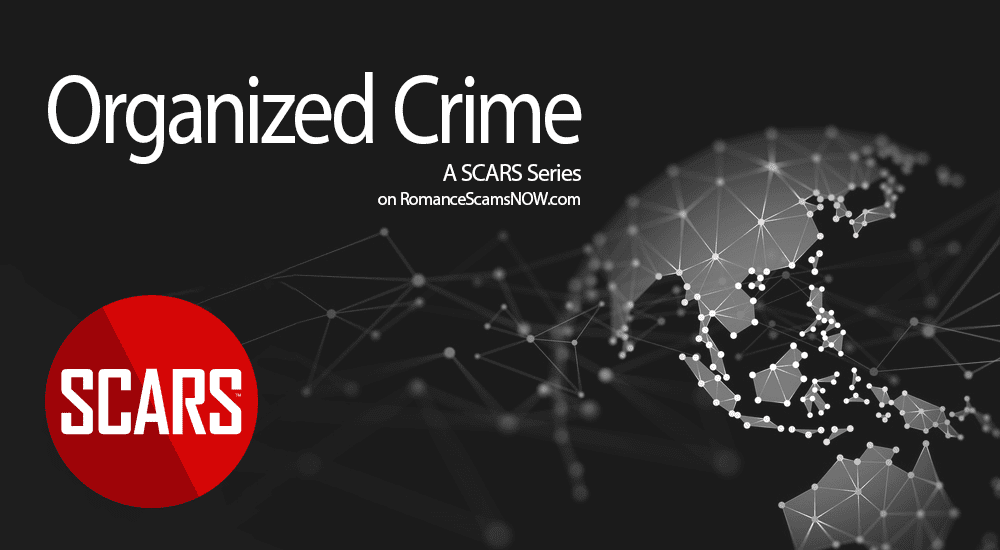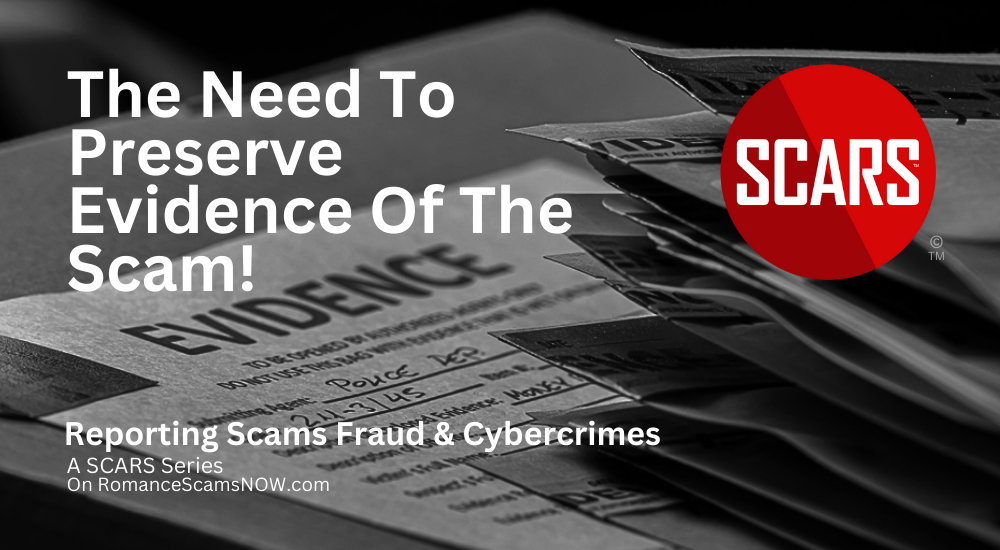
SCARS Institute’s Encyclopedia of Scams™ Published Continuously for 25 Years

Author:
• Tim McGuinness, Ph.D., DFin, MCPO, MAnth – Anthropologist, Scientist, Director of the Society of Citizens Against Relationship Scams Inc.
Article Abstract

Safeguarding Justice: The Crucial Role of Evidence Preservation in Reporting Cybercrimes
In an era dominated by digital interactions, the rise of cybercrimes, scams, and fraud has become an unfortunate reality.
As victims navigate the aftermath of these incidents, they often find themselves in the role of digital detectives, tasked with preserving critical evidence that could bring perpetrators or scammers to justice. Beyond aiding law enforcement, the importance of preserving evidence extends to various facets of combating cyber threats.
Why the Evidence Matters
<ore and more, law enforcement is arresting scammers, and when they do, they often investigate who the scammers have victimized. This leads them to the identities of victims who did not even report, and if those victims have preserved their evidence they are in a better position to see their case added to the charges against the arrested scammers, fraudsters, or cybercriminals. This also improves the chance of eventual money recovery from restitution.
Preserving evidence of a scam is a must for scam victims for several reasons:
- Legal Proceedings: Preserved evidence can serve as a foundation for legal action against scammers. Whether pursuing civil remedies or criminal prosecution, documented evidence strengthens the case and increases the likelihood of a successful outcome.
- Law Enforcement Investigations: Law enforcement agencies rely on evidence to investigate and prosecute scammers. Preserved evidence provides investigators with valuable insights into the nature of the scam, its perpetrators, and their methods, facilitating more effective enforcement actions.
- Pattern Recognition: Preserved evidence when reported helps authorities identify patterns and trends in scam activities. By analyzing multiple cases, law enforcement can uncover broader schemes, track the movements of criminal networks, and implement targeted interventions to disrupt their operations.
- Preventing Further Victimization: Sharing evidence with law enforcement and relevant agencies helps prevent further victimization. By alerting authorities to the tactics and strategies used by scammers, victims contribute to the development of preventive measures and public awareness campaigns, reducing the risk for others.
- Recovery and Restitution: Preserved evidence may aid in the recovery of stolen assets or financial losses. In cases where scammers are apprehended and prosecuted, victims may be eligible for restitution or compensation. Detailed evidence strengthens their claims and supports the restitution process.
- Victim’s Impact Statements and Sentencing: The evidence will help scam victims create better victim impact statements that can have a dramatic effect on the sentences that these criminals receive when convicted.
- Educational Purposes: Preserved evidence can be used for educational purposes to raise awareness about scams and educate the public on how to recognize and avoid them. By sharing their experiences and evidence, victims help empower others to protect themselves from falling prey to similar schemes.
Preserving evidence of a scam empowers victims to seek justice, aids law enforcement in combating cybercrime, and contributes to the prevention of future victimization. It serves as a tangible reminder of the scammer’s actions and ensures that their illicit activities do not go unchecked.
Preserving the Digital Trail
When confronted with a scam or cybercrime, it’s easy to underestimate the significance of seemingly mundane digital artifacts. However, that suspicious email, phishing attempt, or ransomware message represents more than just pixels on a screen – it is tangible evidence with the potential to halt criminal operations and initiate legal proceedings.
Of course, if you were not actually victimized, just report it and then it is no longer needed. But if a victim was harmed in a scam, then the evidence if always needed and scam victims should resist the urge to just delete thinking that it will help them to recover.
Law enforcement agencies, equipped with the right evidence, can trace the digital trail left by cybercriminals. This includes investigating the origin of phishing emails, tracking financial transactions, and identifying patterns in the modus operandi of hackers. For these investigations to be effective, victims must play a proactive role in safeguarding and providing evidence.
Remember that it does not matter if you hear back from an agency after reporting the crime. Many times they simply do not have the resources to follow up unless they need more information or are actively investigating. Sharing the evidence is a critical component in helping law enforcement to make informed decisions and aid their investigations.
Comprehensive Evidence
The array of evidence that can substantiate a cybercrime report can be extensive. Victims should diligently compile and secure documents that might be linked to the incident. This could include canceled checks, certified mail receipts, chatroom or newsgroup transcripts, credit card receipts, and even physical items like envelopes or web links.
Digital evidence is equally crucial, encompassing log files with date and time stamps, social media messages, wire receipts, and copies of emails and web pages. Preserving these electronic documents in their original format, including full email headers, ensures their integrity and authenticity, bolstering the strength of the evidence.
Evidence Items That Should Be Preserved:
Always keep the evidence items in a safe location in the event you are asked to provide them for investigative or prosecution purposes.
All of the following documentation might be considered evidence, but you should keep anything you think could be related to the incident:
- Canceled checks (copies of either sent or received checks)
- Certified or other mail receipts
- Chat or message text
- Credit card receipts
- Envelopes (if you received items via FedEx, UPS or U.S. Mail or other courier)
- Scanned documents (sent or received, including PDF files)
- Log files, if available, with date, time and time zone (most victims will not have these)
- Social media profiles, posts, and messages
- Money transfer order receipts
- Pamphlets or brochures
- Phone bills and call summaries
- Copies of emails, preferably electronic copies. If you print the email, include full email header information
- Copies of web pages, preferably electronic
- Wire transfer receipts and recorder
- Cryptocurrency purchases, wallet information, and transfers
A Toolkit for Justice
Preserving evidence serves as a toolkit for justice, enabling not only the identification and prosecution of cybercriminals but also acting as a deterrent against future crimes. By keeping a detailed record of the incident, victims contribute to the collective effort to curb cyber threats and protect others from falling victim to similar schemes.
Learn more about this here: Reporting Scams – A Scam Victim’s Checklist (romancescamsnow.com)
We also recommend our low-cost SCARS RED BOOK Cybercrime Organized: SCARS RED BOOK – Your Personal Scam Evidence & Crime Record – SCARS Company Store (againstscams.org)
The Role of Victims in Cybercrime Prevention
Victims of cybercrimes are unwittingly thrust into the frontline of cybercrime prevention. Their meticulous preservation of evidence acts as a shield against the evolving tactics of cybercriminals. Moreover, it facilitates collaboration between victims and law enforcement agencies, fostering a symbiotic relationship that strengthens the overall cybersecurity landscape.
Summary
In the scam and cybercrime age, where the battle against cyber threats is forever ongoing, the role of evidence preservation cannot be overstated.
It is a fundamental aspect of reporting cybercrime to preserve the evidence, ensuring that law enforcement agencies have the necessary tools to pursue investigations.
Beyond that, preserving evidence empowers victims to actively participate in the collective effort to retain their law enforcement and reporting options, while safeguarding their future potential recovery. We have seen several cases where the government has forced financial companies to reimburse victims over the years, but that is only possible when the scam victims retain the evidence.
By recognizing the importance of preserving evidence, victims become integral contributors to justice and catalysts for positive change in the fight against cybercrime.
More Reporting Scams & Interacting With The Police:
- Reporting Scams – A Scam Victim’s Checklist (romancescamsnow.com)
- SCARS RED BOOK – Your Personal Scam Evidence & Crime Record – SCARS Company Store (againstscams.org)
- Reporting Scams Worldwide (romancescamsnow.com)
- Victim’s Impact Statements (romancescamsnow.com)
- Law Enforcement & Police – Article Catalog (romancescamsnow.com)
-/ 30 /-
What do you think about this?
Please share your thoughts in a comment below!
Table of Contents
- Reporting Scams Fraud & Cybercrimes and What to Do Next!
- Article Abstract
- Safeguarding Justice: The Crucial Role of Evidence Preservation in Reporting Cybercrimes
- Why the Evidence Matters
- Preserving the Digital Trail
- Comprehensive Evidence
- A Toolkit for Justice
- The Role of Victims in Cybercrime Prevention
- Summary
- More Reporting Scams & Interacting With The Police:
LEAVE A COMMENT?
Thank you for your comment. You may receive an email to follow up. We never share your data with marketers.
Recent Comments
On Other Articles
- on Love Bombing And How Romance Scam Victims Are Forced To Feel: “I was love bombed to the point that I would do just about anything for the scammer(s). I was told…” Feb 11, 14:24
- on Dani Daniels (Kira Lee Orsag): Another Scammer’s Favorite: “You provide a valuable service! I wish more people knew about it!” Feb 10, 15:05
- on Danielle Delaunay/Danielle Genevieve – Stolen Identity/Stolen Photos – Impersonation Victim UPDATED 2024: “We highly recommend that you simply turn away form the scam and scammers, and focus on the development of a…” Feb 4, 19:47
- on The Art Of Deception: The Fundamental Principals Of Successful Deceptions – 2024: “I experienced many of the deceptive tactics that romance scammers use. I was told various stories of hardship and why…” Feb 4, 15:27
- on Danielle Delaunay/Danielle Genevieve – Stolen Identity/Stolen Photos – Impersonation Victim UPDATED 2024: “Yes, I’m in that exact situation also. “Danielle” has seriously scammed me for 3 years now. “She” (he) doesn’t know…” Feb 4, 14:58
- on An Essay on Justice and Money Recovery – 2026: “you are so right I accidentally clicked on online justice I signed an agreement for 12k upfront but cd only…” Feb 3, 08:16
- on The SCARS Institute Top 50 Celebrity Impersonation Scams – 2025: “Quora has had visits from scammers pretending to be Keanu Reeves and Paul McCartney in 2025 and 2026.” Jan 27, 17:45
- on Scam Victims Should Limit Their Exposure To Scam News & Scammer Photos: “I used to look at scammers photos all the time; however, I don’t feel the need to do it anymore.…” Jan 26, 23:19
- on After A Scam, No One Can Tell You How You Will React: “This article was very informative, my scams happened 5 years ago; however, l do remember several of those emotions and/or…” Jan 23, 17:17
- on Situational Awareness and How Trauma Makes Scam Victims Less Safe – 2024: “I need to be more observant and I am practicing situational awareness. I’m saving this article to remind me of…” Jan 21, 22:55
ARTICLE META
Important Information for New Scam Victims
- Please visit www.ScamVictimsSupport.org – a SCARS Website for New Scam Victims & Sextortion Victims
- Enroll in FREE SCARS Scam Survivor’s School now at www.SCARSeducation.org
- Please visit www.ScamPsychology.org – to more fully understand the psychological concepts involved in scams and scam victim recovery
If you are looking for local trauma counselors please visit counseling.AgainstScams.org or join SCARS for our counseling/therapy benefit: membership.AgainstScams.org
If you need to speak with someone now, you can dial 988 or find phone numbers for crisis hotlines all around the world here: www.opencounseling.com/suicide-hotlines
A Note About Labeling!
We often use the term ‘scam victim’ in our articles, but this is a convenience to help those searching for information in search engines like Google. It is just a convenience and has no deeper meaning. If you have come through such an experience, YOU are a Survivor! It was not your fault. You are not alone! Axios!
A Question of Trust
At the SCARS Institute, we invite you to do your own research on the topics we speak about and publish, Our team investigates the subject being discussed, especially when it comes to understanding the scam victims-survivors experience. You can do Google searches but in many cases, you will have to wade through scientific papers and studies. However, remember that biases and perspectives matter and influence the outcome. Regardless, we encourage you to explore these topics as thoroughly as you can for your own awareness.
Statement About Victim Blaming
SCARS Institute articles examine different aspects of the scam victim experience, as well as those who may have been secondary victims. This work focuses on understanding victimization through the science of victimology, including common psychological and behavioral responses. The purpose is to help victims and survivors understand why these crimes occurred, reduce shame and self-blame, strengthen recovery programs and victim opportunities, and lower the risk of future victimization.
At times, these discussions may sound uncomfortable, overwhelming, or may be mistaken for blame. They are not. Scam victims are never blamed. Our goal is to explain the mechanisms of deception and the human responses that scammers exploit, and the processes that occur after the scam ends, so victims can better understand what happened to them and why it felt convincing at the time, and what the path looks like going forward.
Articles that address the psychology, neurology, physiology, and other characteristics of scams and the victim experience recognize that all people share cognitive and emotional traits that can be manipulated under the right conditions. These characteristics are not flaws. They are normal human functions that criminals deliberately exploit. Victims typically have little awareness of these mechanisms while a scam is unfolding and a very limited ability to control them. Awareness often comes only after the harm has occurred.
By explaining these processes, these articles help victims make sense of their experiences, understand common post-scam reactions, and identify ways to protect themselves moving forward. This knowledge supports recovery by replacing confusion and self-blame with clarity, context, and self-compassion.
Additional educational material on these topics is available at ScamPsychology.org – ScamsNOW.com and other SCARS Institute websites.
Psychology Disclaimer:
All articles about psychology and the human brain on this website are for information & education only
The information provided in this article is intended for educational and self-help purposes only and should not be construed as a substitute for professional therapy or counseling.
While any self-help techniques outlined herein may be beneficial for scam victims seeking to recover from their experience and move towards recovery, it is important to consult with a qualified mental health professional before initiating any course of action. Each individual’s experience and needs are unique, and what works for one person may not be suitable for another.
Additionally, any approach may not be appropriate for individuals with certain pre-existing mental health conditions or trauma histories. It is advisable to seek guidance from a licensed therapist or counselor who can provide personalized support, guidance, and treatment tailored to your specific needs.
If you are experiencing significant distress or emotional difficulties related to a scam or other traumatic event, please consult your doctor or mental health provider for appropriate care and support.
Also read our SCARS Institute Statement about Professional Care for Scam Victims – click here to go to our ScamsNOW.com website.
















I have followed all these steps. I have kept a digital record of the chat messages, I have all the gift cards and receipts. Even my credit card statements. Plus I printed all copies of any updates I made with Ic3. I updated every time I purchased gift cards. I have it in the event anything moves forward on my case.
I did look up what services are available here in my State. Not much, it is all more geared to PHYSICAL abuse victims rather than cybercrime.
I spent a lot of time documenting my pig butcher fraud experience but it was worth it. It was painful reliving the experience but I was able to gain new insight taking another look at what happened. I can now move forward and don’t have to look back knowing the information is there if ever needed.